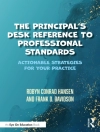`Professor Harlen has, once again, provided the leading text on primary science. This eminently readable book sets out a clear account of our understanding of learning, teaching and assessment and, through the skilful use of examples, explores the implications of this for science teachers of pupils aged five to 12. By emphasizing the importance of research evidence and the way in which it should underpin practice, this new edition challenges everyone involved in science education to reflect again on whether we are providing the most appropriate learning opportunities for our pupils. It is certainly a book which will be highly recommended, referred to on many occasions and used extensively′ – Dr Derek Bell, Chief Executive, The Association for Science Education
This thoroughly revised and completely up-to-date new edition provides an excellent theoretical framework for teaching science that is firmly grounded in classroom practice and covers all stages of education for students aged five to 12 years.
The author details a constructivist view of learning, which recognizes that children already have ideas about the world in which they live, and gives advice on how teachers can help children to develop their understanding and change their perception to a more scientific view. A particular feature is the focus on formative assessment as a framework for discussion on how to help students develop their understanding, enquiry skills and positive attitudes to scientific investigation.
The wide range of topics covered include:
The nature of students′ learning in science
The goals of science education
Gathering and interpreting information about students′ ′s ideas
Helping development of scientific ideas
Gathering and interpreting evidence of students′ enquiry skills and attitudes
Strategies for helping development of students′ qnquiry skills and attitudes
The learner′s role in learning
Summarising and reporting learning
Motivating learning
Teachers and children′s questions
Resources for learning science
Managing science in the school
Each chapter features useful summaries, points for reflection and further reading, making this acclaimed book indispensable reading for all primary and practitioners and students who want a book that will authoritatively inform, inspire and instruct their science teaching.
Tabella dei contenuti
Introduction
Part I About learning in science
Learning in science
Children learning
The goals of science education
Part II Opportunities for learning
Providing for development 5-12
Teachers′ and children′s questions
Motivation for learning
Part III Using assessment for learning
Helping learning
A framework for decisions
Gathering and interpreting evidence of children′s science process skills and attitudes
Helping development of process skills and attitudes of science
Gathering and interpreting evidence of children′s ideas
Helping the development of scientific ideas
The children′s role in using assessment for learning
Part IV Managing learning in science
Summarising and recording learning
Resources for learning science
Managing science at the School Level
Circa l’autore
Professor Wynne Harlen is one of the key international figures in primary science. She was most recently head of the Scottish Council for Research in Education and is now retired.












